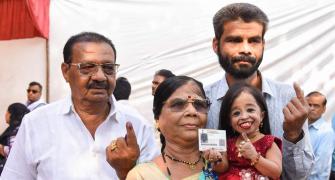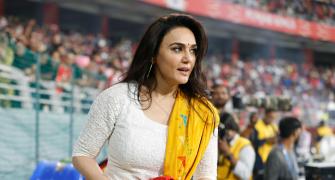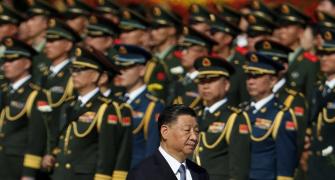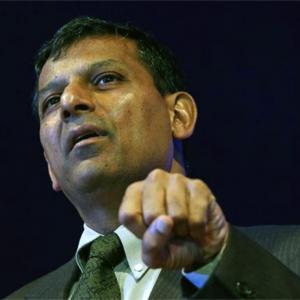The Reserve Bank of India is not a free agent. It never has been, nor should it ever be, explains T C A Srinivasa-Raghavan.
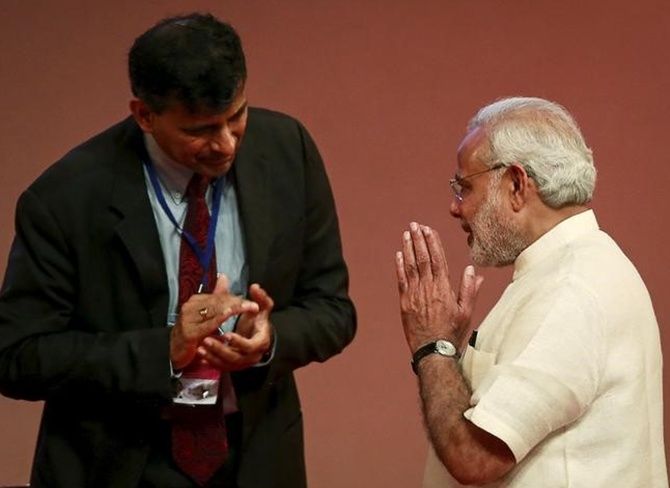 Raghuram Rajan says we must distinguish between what is de jure and what is de facto.
Raghuram Rajan says we must distinguish between what is de jure and what is de facto.
He adds that, de facto, the Reserve Bank of India (RBI) is independent.
Here is a very short summary of the RBI vs the government. It is very telling.
Who's the boss?
No sooner was the recommendation made in 1926 to set up the RBI, a controversy arose as to who would control it.
Some said that the shareholders of the Imperial Bank should control it. The government said no, that was politically impracticable.
In September 1930 the Government of India told the British government that a central bank had to be formed before any financial responsibility was transferred to the Indians.
In 1931, the Central Banking Enquiry Committee strongly recommended the establishment of the Reserve Bank and noted: "The paramount interests for the country involved in the establishment... of such an independent institution, free from political influence, can hardly be overestimated."
In 1933, a White Paper on the new constitutional reform also assumed that it would be free from political influence.
A little later the finance member of the Viceroy's Council said, "when the direction of public finance is in the hands of a ministry responsible to a popularly elected legislature... it is desirable that the control of currency and credit in the country should be in the hands of an independent authority." He added that it should be "independent of political influence".
Indian nationalists were against the board being selected by private shareholders. They wanted it to be an agent of the state so that public interest was always kept in view.
The government was determined to have its nominees. Politicians wanted the legislature to have a say in the selection of the Board. The Muslims wanted "safeguards".
The British ignored everyone and decided to have a shareholders' bank, like the Bank of England. They thought private ownership would insulate the RBI from political interference.
Some sops were thrown in to satisfy the politicians, but control remained firmly in private British hands and through them, in the hands of the Viceroy's Council.
Who do you think I am?
No less than the first governor, Osborne Smith, rebelled against this. As head of the Imperial Bank he had once complained that "anyone would assume that the Imperial (Bank) was a department and a very inconspicuous department of the government".
In 1936, he wrote that he was "sick to death" of the government's attempt to dominate the RBI. He also called the Viceroy a "weak ass". That cooked his goose.
When Smith wanted appoint AD Shroff, an ICS officer, as deputy governor, John Grigg, the finance member, dismissed the suggestion calling Shroff "a perfectly frightful man and intimate crony" of Smith. A little later, Smith was sacked. The man who took over from Smith was a crony of Grigg, James Taylor.
It was game, set and match to the government.
Taylor's first task, made clear to him by Grigg, was to bring the RBI Board to heel. It had a lot of Indian businessmen on it who often defied Grigg.
Grigg wrote in his autobiography that the Board was dominated by "Hindu" businessmen owing allegiance to the Congress. "This might have had serious consequences. That it did not was due largely to the skill and tact of Sir James Taylor... he showed utmost loyalty to me..."
When Taylor died in 1943, an Indian governor, CD Deshmukh, was appointed. He tried his best to balance Indian and British interests. But even he once told the finance department not to interfere: "...I cannot engage to do in subservience to what amounts to a claim to be consulted... I regard it as important... that the independence of the Reserve Bank be preserved... and I feel constrained to enter a caveat against any semblance of an encroachment on its discretion."
An occasional rebellion
Thirty-four years later, in 1979, a youngish special secretary in the finance ministry called Manmohan Singh would give a sharp rap on the RBI's knuckles for not consulting the government over some minor issue.
Then again, in 1985, a young and brash chief economic advisor called Bimal Jalan would take strong exception to something the RBI had done without consulting him.
The RBI has, from time to time, rebelled against the finance ministry.
The story goes relentlessly on from Benegal Rama Rau (1949-57) to Duvvuri Subbarao (2008-13). But in the end its independence was best summed up by Y V Reddy (2003 to 2008).
Asked about RBI independence he said: "It is totally free - within the limits set by the government."
More philosophically, I might ask, is a fly in a bottle free or captive?




